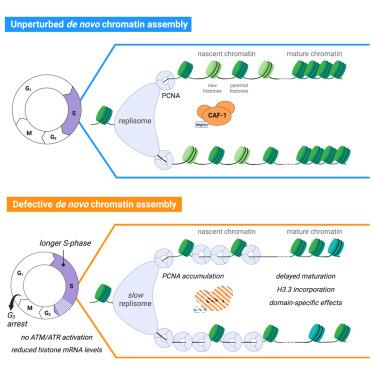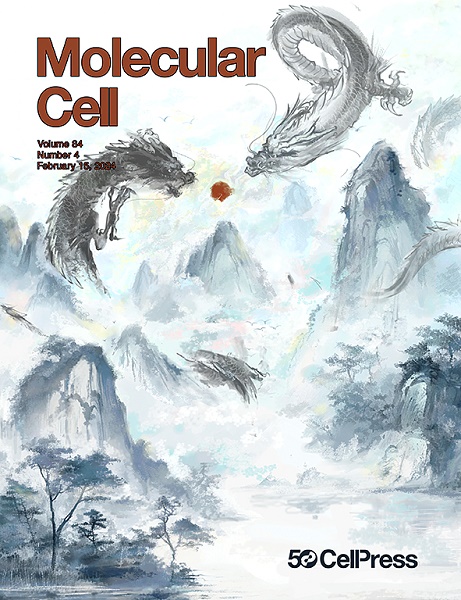Acute multi-level response to defective de novo chromatin assembly in S-phase
IF 14.5
1区 生物学
Q1 BIOCHEMISTRY & MOLECULAR BIOLOGY
引用次数: 0
Abstract
Long-term perturbation of de novo chromatin assembly during DNA replication has profound effects on epigenome maintenance and cell fate. The early mechanistic origin of these defects is unknown. Here, we combine acute degradation of chromatin assembly factor 1 (CAF-1), a key player in de novo chromatin assembly, with single-cell genomics, quantitative proteomics, and live microscopy to uncover these initiating mechanisms in human cells. CAF-1 loss immediately slows down DNA replication speed and renders nascent DNA hyper-accessible. A rapid cellular response, distinct from canonical DNA damage signaling, is triggered and lowers histone mRNAs. In turn, histone variants’ usage and their modifications are altered, limiting transcriptional fidelity and delaying chromatin maturation within a single S-phase. This multi-level response induces a p53-dependent cell-cycle arrest after mitosis. Our work reveals the immediate consequences of defective de novo chromatin assembly during DNA replication, indicating how at later times the epigenome and cell fate can be altered.

对 S 期染色质从头组装缺陷的急性多级响应
DNA 复制过程中染色质从头组装的长期扰动会对表观基因组的维持和细胞命运产生深远影响。这些缺陷的早期机理起源尚不清楚。在这里,我们将染色质组装因子 1(CAF-1)(染色质从头组装的关键角色)的急性降解与单细胞基因组学、定量蛋白质组学和活体显微镜相结合,揭示了人类细胞中的这些启动机制。CAF-1的缺失会立即降低DNA复制速度,并使新生DNA变得极易获取。一种有别于典型 DNA 损伤信号的快速细胞反应被触发并降低组蛋白 mRNA。反过来,组蛋白变体的使用及其修饰也发生了改变,从而限制了转录的保真度,并推迟了染色质在单个 S 期的成熟。这种多级反应诱导了有丝分裂后依赖 p53 的细胞周期停滞。我们的研究揭示了DNA复制过程中染色质从头组装缺陷的直接后果,并指出了表观基因组和细胞命运在后期如何发生改变。
本文章由计算机程序翻译,如有差异,请以英文原文为准。
求助全文
约1分钟内获得全文
求助全文
来源期刊

Molecular Cell
生物-生化与分子生物学
CiteScore
26.00
自引率
3.80%
发文量
389
审稿时长
1 months
期刊介绍:
Molecular Cell is a companion to Cell, the leading journal of biology and the highest-impact journal in the world. Launched in December 1997 and published monthly. Molecular Cell is dedicated to publishing cutting-edge research in molecular biology, focusing on fundamental cellular processes. The journal encompasses a wide range of topics, including DNA replication, recombination, and repair; Chromatin biology and genome organization; Transcription; RNA processing and decay; Non-coding RNA function; Translation; Protein folding, modification, and quality control; Signal transduction pathways; Cell cycle and checkpoints; Cell death; Autophagy; Metabolism.
 求助内容:
求助内容: 应助结果提醒方式:
应助结果提醒方式:


